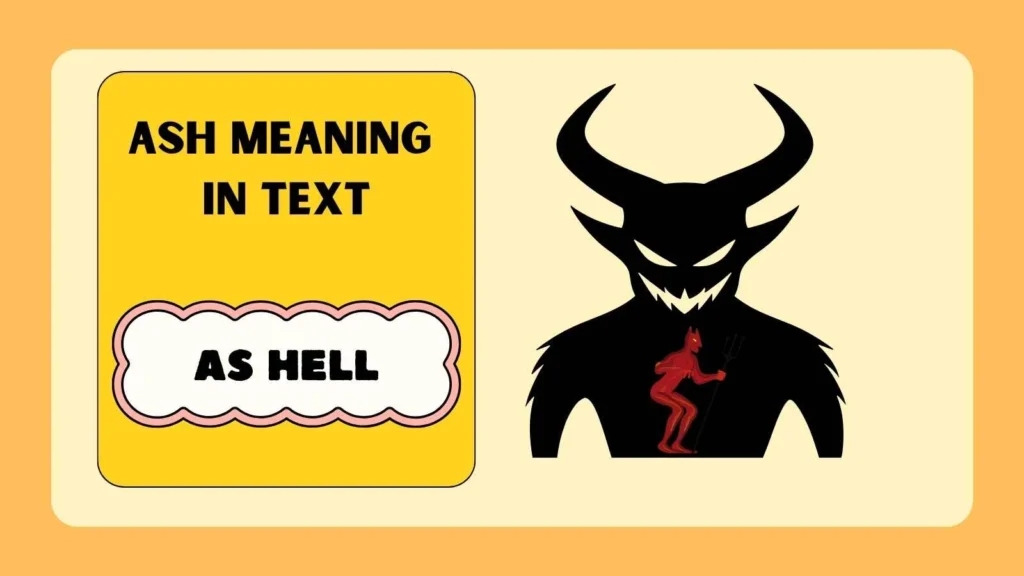Have you ever scrolled through messages or social media and spotted the word “ash” in a text? If so, you’re not alone. Many people pause and wonder, what does ash mean in text? Unlike standard dictionary words, internet slang often takes on new forms and meanings that evolve quickly.
Ash is one such example—it can represent a name, abbreviation, or even a casual expression depending on context. Because digital communication thrives on shorthand and creativity, understanding these terms is essential for avoiding confusion and staying in the loop.
In this guide, we’ll explore the definition, origins, usage, variations, and hidden meanings behind “ash” in text, along with tips on how to respond when you see it.
Whether you’re chatting with friends, engaging online, or interpreting slang on dating apps, this article will give you everything you need to confidently decode ash in modern texting.
Definition & Meaning
The term ash in text can carry different meanings:
- Name/Nickname: Ash is a common short form for names like Ashley, Ashton, or Ashlyn.
- Abbreviation: In texting slang, ASH may stand for “As Hell” (used to emphasize something, e.g., “tired ASH”).
- Expression: Sometimes, ash is used casually to replace curse words or as filler in conversations.
Essentially, the meaning depends on who’s using it and in what context. In personal chats, it might signal a person’s name. In casual slang, it’s a stylistic way of writing.
Background & History
The word ash originates from Old English, where it referred to the ash tree or ashes from fire. However, its digital transformation is tied to two main influences:
- Nicknames: Ashley and Ashton became widely popular names in the 1980s–2000s, and “Ash” emerged as a friendly short form.
- Slang Evolution: Around the mid-2010s, “ash” appeared in online communities as shorthand for “as hell.” Over time, this usage spread across platforms like Twitter, TikTok, and Snapchat.
Thus, while “ash” has deep linguistic roots, its modern slang identity is very much a product of the internet age.
Usage in Various Contexts
- Personal Texts: “Ash” often stands for a person’s name or nickname.
- Slang: Example: “That movie was boring ash” = boring as hell.
- Gaming/Anime: In fandoms, “Ash” may refer to famous characters like Ash Ketchum from Pokémon.
- Emotional Tone: Used as a softener in messages to make conversations casual.
The context clues (capitalization, sentence structure, platform) usually help clarify which meaning is intended.
Common Misconceptions & Clarifications
- Not Always a Name: Many assume it’s only short for Ashley or Ashton, but it’s also slang.
- Not Always Vulgar: While “as hell” is a strong phrase, ash itself isn’t inherently offensive.
- Not Universal: Some regions don’t use “ash” at all in slang, leading to confusion.
By understanding these clarifications, readers can avoid misinterpretation.
Similar Terms & Alternatives
Other expressions with similar tone or purpose include:
- AF (as f**): widely used online.
- Hella: a casual slang for emphasis.
- So damn: more traditional phrasing.
- Lit: used to show excitement.
Compared to these, ash feels more playful and less harsh.
How to Respond to This Term
When someone texts “ash”:
- If it’s a name, reply normally as you would with a friend.
- If it’s slang for “as hell”, respond in the same casual tone.
- If unsure, politely ask for clarification—this prevents miscommunication.
Regional or Cultural Differences
- United States & Canada: Most often used as slang or nickname.
- UK & Europe: Less common; usually understood only as a name.
- Asia: Frequently connected with pop culture characters (like Ash Ketchum).
- Online Subcultures: Heavily used in memes, TikTok captions, and fandom spaces.
Comparison with Similar Terms
Unlike AF or hella, which are strongly tied to American youth slang, ash is softer and more versatile. It works both as a name and an emphasis word, making it unique among internet terms.
Usage in Online Communities & Dating Apps
On dating apps like Tinder or Bumble, “Ash” often appears as:
- Profile Name: A nickname for Ashley/Ashton.
- Casual Message: Example: “You’re funny ash” (playful compliment).
- Memes & Humor: Used to avoid profanity but still add emphasis.
In online groups, especially on Reddit or Twitter, ash shows up in memes and inside jokes, boosting relatability.
Hidden or Offensive Meanings
While “ash” itself isn’t offensive, when used as ASH = As Hell, it might be interpreted as slang-heavy or slightly informal. Context is key—what seems playful in casual chat may look unprofessional elsewhere.
Suitability for Professional Communication
Using ash in text is not recommended in work emails, formal chats, or academic writing. It works best in casual, personal, or humorous exchanges. For professionalism, stick with clear language to avoid misinterpretation.
FAQs
What does ash mean in text?
It usually means a nickname (Ashley/Ashton) or slang for “as hell.”
Is ash a bad word?
No, it’s not offensive—though it can imply strong emphasis.
Do people use ash on social media?
Yes, it’s popular in memes, captions, and casual posts.
Can ash mean something romantic?
On dating apps, it can appear as a name or playful slang in flirty chats.
Is ash used worldwide?
Not universally—its slang use is more common in North America.
Should I use ash in professional texts?
No, keep it to casual or friendly conversations only.
Conclusion
The phrase ash in text is a versatile and evolving term. It can mean a nickname, a slang version of “as hell,” or even a pop culture reference depending on context.
While widely used in casual online communication, it’s not always suitable for professional or formal settings.
By learning the definitions, origins, cultural uses, and clarifications, you can better understand and respond to this unique digital term.
Whether you spot it in a friend’s text, a meme, or a dating app bio, you’ll now know exactly what it means—and when it’s best to use (or avoid) it.
